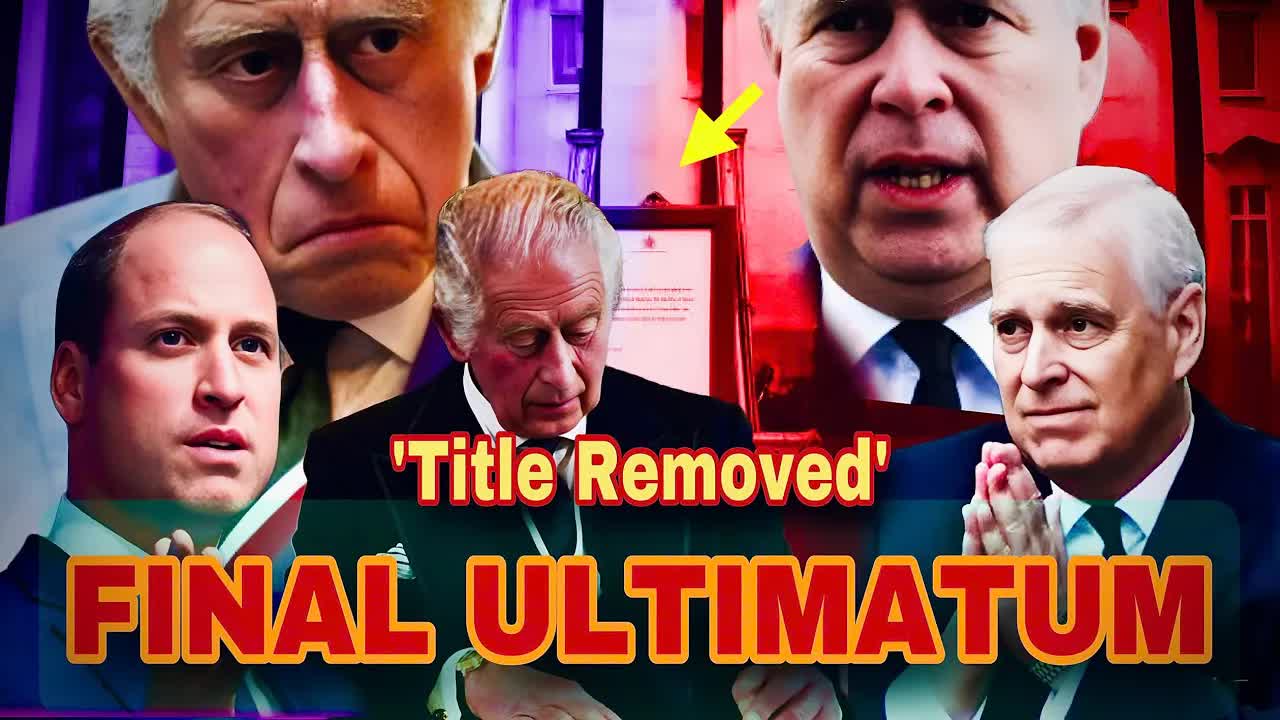In a groundbreaking decision that has sent shockwaves through the royal family, King Charles has officially stripped Prince Andrew of his Duke of York title.
This move is not just a personal blow to Andrew; it signifies a monumental shift in the monarchy’s approach to accountability and tradition.
According to sources close to the situation, this bold action is a pivotal moment in the history of the British monarchy, raising questions about the future dynamics within the royal family.
The decision, which also includes the withdrawal of financial support for Andrew, has left many in the royal household reeling.
It’s a clear indication that King Charles is serious about modernizing the monarchy and aligning it with contemporary values.
Historically, members of the royal family retained their titles regardless of personal scandals, making this move particularly striking.
It’s as if the monarchy is finally acknowledging the need for accountability, shedding light on the complexities of royal responsibilities.
Discussions leading up to this decision involved senior royals and legal experts, ensuring that the revocation was both well thought out and legally sound.
The process of stripping a royal title is anything but simple.
It requires extensive legal and constitutional scrutiny, consultations with experts, and potential involvement from Parliament.
In this instance, King Charles exercised his royal prerogative—a power typically wielded cautiously—to make a decisive change.
Buckingham Palace publicly explained the reasoning behind this unprecedented move, emphasizing the necessity for the monarchy to resonate with the public’s expectations.
However, the implications extend beyond Andrew himself.
The financial ramifications of this decision will undoubtedly affect his daughters, Princess Beatrice and Princess Eugenie, who now face uncertainty regarding their inheritance and royal status.
With the loss of royal funding, Prince Andrew must now shoulder the full financial burden of maintaining the Royal Lodge, his residence in Windsor.
Real estate expert Terry Fisher has pointed out that this situation could lead to complications with the property’s succession.
Andrew has a long-term lease, but royal leases often come with stipulations that may limit his ability to pass it on to family members.
As costs rise, sustaining the Royal Lodge might become an insurmountable challenge for him.
Amidst these financial strains, speculation has emerged that Prince William and Catherine, Princess of Wales, might be considered as potential heirs to the property.
However, insiders suggest that Prince William is more focused on his immediate family rather than taking on additional royal responsibilities.
This scenario highlights the often overlooked challenges of royal inheritance, which can be riddled with obstacles despite the public’s perception of royal life as one of unending wealth.
The emotional toll of this situation cannot be understated.
While many applaud King Charles for taking a stand, there is a growing sense of sympathy for Beatrice and Eugenie, who find themselves entangled in their father’s controversies.
The public mood reflects a nuanced understanding of the complexities at play—balancing the need for accountability with compassion for those affected by Andrew’s actions.
Andrew’s troubles extend far beyond financial woes.
His connections to the late Jeffrey Epstein and allegations of sual misconduct have severely tarnished his public image.
The infamous 2019 BBC interview, where he attempted to defend himself, only intensified public scrutiny.
Although he maintained a close relationship with his mother, Queen Elizabeth II, the dynamics shifted after her passing, with King Charles and Prince William advocating for Andrew’s removal from royal duties.
Interestingly, some reports suggest that Queen Consort Camilla may have influenced King Charles’ decision.
While these claims are speculative, they underscore the intricate relationships within the royal family and how they shape decisions affecting its future.
Camilla’s role as a confidante to the King places her in a significant position regarding royal matters, especially those concerning public perception and family dynamics.
Public opinion on this matter is far from uniform.
While many view King Charles’ decision as a necessary step towards transparency and reform, others express concern for Andrew’s daughters, who bear the brunt of their father’s choices.
The debate surrounding Andrew’s title has sparked broader discussions about the monarchy’s role in modern society and the urgent need for reform.
As the monarchy steps into this new chapter, the implications of King Charles’ decision are profound.
The revocation of Prince Andrew’s title not only alters the landscape of royal privileges but also serves as a reflection of a monarchy striving to remain relevant in changing times.
The challenges of inheritance, public perception, and family relations will undoubtedly continue to influence the royal family’s future trajectory.
This transformative moment marks the end of an era characterized by unquestioned privilege within the royal family.
Moving forward, the monarchy faces the delicate task of balancing tradition with the pressing demands for accountability and change.
Whether this decision fortifies the institution or reveals deeper vulnerabilities remains to be seen, but one thing is certain: the winds of change are sweeping through the British monarchy.










